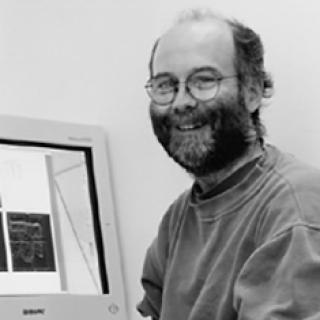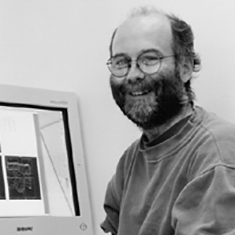
Remy Bosselut, M.D., Ph.D.
- Center for Cancer Research
- National Cancer Institute
- Building 37, Room 3016A
- Bethesda, MD 20892-4259
- 240-760-6866
- bosselur@mail.nih.gov
RESEARCH SUMMARY
Our lab's focus is on the transcriptional control of CD4+ T cell development and function. We are specifically interested in the transcriptomic programs controlling the emergence of CD4+ lineage in the thymus and in the transcriptional control of CD4+ T cell responses to pathogens and tumors.
Areas of Expertise

Remy Bosselut, M.D., Ph.D.
Research
We study immune responses, broadly speaking, but are most interested in the development and functions of T cells, a component of the immune system that is required for control of infections. We are specifically interested in CD4+ T cells, which in humans are the target of HIV, and are critical for most adaptive immune responses.
We have a comprehensive approach to research. Researchers in the lab integrate experimental approaches, including single cell and tissue “omics” analyses (which are a major focus of the lab), genetics, in vivo models of infection and tumor, and bioinformatics, e.g. modeling gene regulatory networks (1).
Current research is directed at three questions.
1-CD4+ T cell development in the thymus. Building on the laboratory’s long-standing interests (2), ongoing research investigates new signals or factors that direct CD4+ T cell development, and mechanisms that mediate the function of Thpok, a transcription factor required for the development of CD4+ T cells in the thymus and their post-thymic functions (3).
2-CD4+ T cell responses to infection and tumor. These studies have become a major area of focus in the laboratory. Using single-cell RNAseq and ATACseq, we recently characterized CD4+ T cell responses to infection (4-6) or tumors (7). Current research leverages newly developed experimental models to compare how CD4+ T cells control chronic infections and tumors, and to design strategies to harness their anti-tumor potential.
3-Role of the thymus in immune tolerance. Maintaining immune homeostasis, including tolerance to self-antigens and commensals at mucosal barriers, is a critical function of T cells. Recent (1 , 8) and ongoing studies investigate how the thymus contributes to tolerance through the deletion of self-reactive T cell precursors and generation of T cells with immunoregulatory functions.
Cited publications
1. L. B. Chopp et al., An Integrated Epigenomic and Transcriptomic Map of Mouse and Human αβ T Cell Development. Immunity 53, 1182-1201.e1188 (2020).
2. G. Sun et al., The zinc finger protein cKrox directs CD4 lineage differentiation during intrathymic T cell positive selection. Nat Immunol 6, 373-381 (2005).
3. Y. Gao et al., NuRD complex recruitment to Thpok mediates CD4(+) T cell lineage differentiation. Sci Immunol 7, eabn5917 (2022).
4. M. S. Vacchio et al., A Thpok-Directed Transcriptional Circuitry Promotes Bcl6 and Maf Expression to Orchestrate T Follicular Helper Differentiation. Immunity 51, 465-478.e466 (2019).
5. T. Ciucci et al., The Emergence and Functional Fitness of Memory CD4(+) T Cells Require the Transcription Factor Thpok. Immunity 50, 91-105.e104 (2019).
6. T. Ciucci et al., Dependence on Bcl6 and Blimp1 drive distinct differentiation of murine memory and follicular helper CD4+ T cells. J Exp Med 219, (2022).
7. A. Magen et al., Single-Cell Profiling Defines Transcriptomic Signatures Specific to Tumor-Reactive versus Virus-Responsive CD4(+) T Cells. Cell Rep 29, 3019-3032.e3016 (2019).
8. J. Nie et al., The transcription factor LRF promotes integrin β7 expression by and gut homing of CD8αα(+) intraepithelial lymphocyte precursors. Nat Immunol 23, 594-604 (2022).
Publications
- Bibliography Link
- View Dr. Bosselut's PubMed Summary.
NuRD complex recruitment to Thpok mediates CD4+ T cell lineage differentiation.
The transcription factor LRF promotes integrin β7 expression by and gut homing of CD8αα+ intraepithelial lymphocyte precursors.
An Integrated Epigenomic and Transcriptomic Map of Mouse and Human αβ T Cell Development.
A Thpok-Directed Transcriptional Circuitry Promotes Bcl6 and Maf Expression to Orchestrate T Follicular Helper Differentiation.
The Emergence and Functional Fitness of Memory CD4+ T Cells Require the Transcription Factor Thpok.
Biography

Remy Bosselut, M.D., Ph.D.
Dr. Remy Bosselut trained at the Institut Curie in Paris, France. He earned his M.D. degree in 1992 from the Xavier Bichat School of Medicine and his Ph.D. degree in 1993 from the University Denis Diderot, both in Paris. Dr. Bosselut obtained postdoctoral training at the NCI Experimental Immunology Branch and joined the Laboratory of Immune Cell Biology in 2000.
Job Vacancies
We have no open positions in our group at this time, please check back later.
To see all available positions at CCR, take a look at our Careers page. You can also subscribe to receive CCR's latest job and training opportunities in your inbox.
Team
News
Learn more about CCR research advances, new discoveries and more
on our news section.

